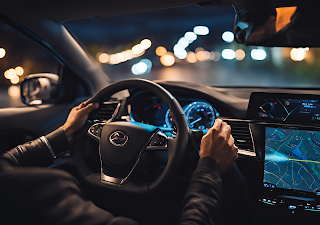In today's fast-paced world, technology has become an integral part of our daily lives. As a driver, you can leverage technology to improve your driving skills, reduce stress, and stay safe on the road. In this article, we'll explore the various ways you can use technology to become a better driver.
The Benefits of Technology in Driving
With the advancement of technology, the driving experience has become more enjoyable and convenient. Here are some of the benefits of using technology while driving:
- Improved Safety: Technology such as lane departure warning systems, blind-spot monitoring, and automatic emergency braking can reduce the risk of accidents.
- Enhanced Navigation: GPS and mapping apps can help you navigate through unfamiliar territories, reducing the risk of getting lost.
- Increased Convenience: Voice assistants, Bluetooth connectivity, and smartphone integrations can make it easier to receive calls, send messages, and access important information while driving.
Top Technology for Better Driving
Here are some of the top technologies that can help you improve your driving skills:
- Dash Cams: A dash cam can provide evidence in case of an accident and can also help you monitor your driving habits.
- GPS and Mapping Apps: GPS and mapping apps such as Google Maps, Waze, and Apple Maps can help you navigate through unfamiliar territories.
- Driver Monitoring Systems: Driver monitoring systems can detect driver fatigue, distracted driving, and other safety-related issues.
- Vehicle Safety Features: Modern vehicles come equipped with a range of safety features such as lane departure warning systems, blind-spot monitoring, and automatic emergency braking.
How to Use Technology to Improve Your Driving Habits
Here are some tips on how to use technology to improve your driving habits:
- Use a Dash Cam: A dash cam can provide evidence in case of an accident and can also help you monitor your driving habits.
- Use GPS and Mapping Apps: GPS and mapping apps can help you navigate through unfamiliar territories, reducing the risk of getting lost.
- Use Driver Monitoring Systems: Driver monitoring systems can detect driver fatigue, distracted driving, and other safety-related issues.
Common Mistakes to Avoid When Using Technology While Driving
Here are some common mistakes to avoid when using technology while driving:
- Distracted Driving: Avoid using your phone or other electronic devices while driving, as it can lead to distracted driving.
- Over-Reliance on Technology: Avoid relying too heavily on technology, as it can lead to complacency and reduce your situational awareness.
Technology has become an integral part of modern driving. By leveraging the right technologies, you can improve your driving skills, reduce stress, and stay safe on the road. Remember to use technology responsibly and avoid distractions while driving.
Find all content about road test or driving tips
Frequently Asked Questions
- What are the benefits of using technology while driving?
The benefits of using technology while driving include improved safety, enhanced navigation, and increased convenience. - What are some of the top technologies for better driving?
Some of the top technologies for better driving include dash cams, GPS and mapping apps, driver monitoring systems, and vehicle safety features. - How can I use technology to improve my driving habits?
You can use technology to improve your driving habits by using a dash cam, GPS and mapping apps, and driver monitoring systems. - What are some common mistakes to avoid when using technology while driving?
Some common mistakes to avoid when using technology while driving include distracted driving and over-reliance on technology. - Can technology replace human judgment while driving?
No, technology cannot replace human judgment while driving. Technology should be used as a tool to support and enhance human judgment, not replace it.








